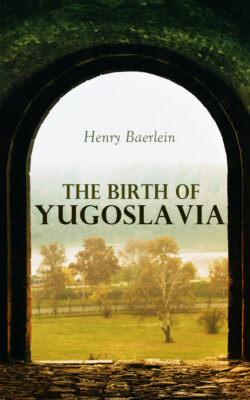Читать книгу The Birth of Yugoslavia - Henry Baerlein - Страница 81
На сайте Литреса книга снята с продажи.
THE MACEDONIAN SLAVS ARE UNDIVIDED
ОглавлениеAnother Macedonian traveller was the highly distinguished Frenchman, Ami Boué. His great book La Turquie d'Europe, in four volumes of more than 500 pages each, appeared in Paris in 1840, and is a veritable encyclopædia with which no other publication of the same kind can be compared, either for the largeness of his scheme, the versatility of his interests or the profound knowledge of his subject. Well, he found that many Slavs of Macedonia, whom he calls Bulgars, had their hopes centred in Miloš, who was then the reigning Serbian Prince. The difference in their eyes between the two people was that the Serbs had gained their independence. It was not as great an independence as the Macedonians fancied, for in addition to the vexatious remains of Turkish suzerainty there was the Greek ecclesiastical rule. During the reigns of Kara George and Miloš the Greeks insisted on having their language used for the liturgy in all the Serbian towns, especially in Belgrade; after that period Greek and Slav were used for half the service each, and this practice was continued until 1858. Nevertheless for the unhappy Macedonians Serbia was a land of radiant liberty. And whether it was going to be a Serb or Bulgar who would rescue them—qu'importe? Ami Boué noted, as have many others, that the Macedonian Slav in his physical characteristics, in his language, in his outlook, in his native habits and in the expression of his sentiments is intermediate between the Serbs and Bulgars. And he says that as between the Serbs and Bulgars he does not recognize a greater difference than there is between the Istrians, the Dalmatians and the Croats, which is to say that there is none.
This point of view was quite familiar to the readers of the Omladinac. Svetozar Marković, a leader of both Radicals and Socialists in Serbia, was for a federated Balkan republic. Ljuben Karaveloff wrote articles in Serbian, whose object was to show that, in the liberation of the Southern Slavs, Serbia must take the lead. Rakovski, the most active of Bulgarian Radicals, maintained that, in default of union between the Southern Slavs, a selfish interference of the Great Powers in the Balkans and unceasing wars among the natives would be unavoidable. The ideas of Bogdanov regarding the Bulgarian and Serbian languages were current. "It is not a tower of Babel," says he, "but a temple of God. When we are united there will be no curse yelled in a hundred voices but a harmonious prayer." And in another passage he declares that "there is less difference, for example, between Serbian and Bulgarian than between certain Italian dialects."
